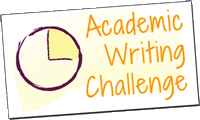My clients and participants in A Meeting With Your Writing, not to mention various people’s posts on social media, remind me that there is such a thing as End of Term Chaos. Just like Beginning of Term Chaos, this is temporary. It will pass.
Is this you?

Are you overwhelmed? Tired? Having difficulty focusing?
Were you maintaining some kind of writing habit and it seems to have gone completely out the window? How about weekends and evenings?
You are not alone.
First, you are tired. Really. It’s been a long semester. You have worked really hard. Being tired in December is a feature not a bug. Fatigue impairs cognitive function. This is why things take longer, and you have more difficulty controlling your emotional reactions. If you have managed to catch a cold, you probably have fewer defences for fighting it off and that’s just making everything worse. If you’ve been fending off a cold, as soon as you relax it’s going to catch up to you.
Although you are (almost) finished teaching, the time you were devoting to teaching preparation is now taken up with grading end of term assignments (especially if you want that feedback to be helpful for your students’ exam preparation), dealing with students who need extra help to complete assignments or prepare for exams, and dealing with students who are having various emotional, financial, and other crises that will affect their learning. This might take more time than you spent on teaching preparation. Furthermore it isn’t scheduled as neatly as your teaching was.
Other people may want certain things wrapped up before the holidays which is putting more pressure on you to attend to certain obligations, whether committee work, writing for an edited collection, or whatever. You may have more meetings scheduled, for example.
Your life outside of work is also more chaotic than usual
You have extra social engagements that you can’t ignore. Departmental parties. Family events. Seasonal events with friends. If you have children, there will be concerts and other events they are involved in and all of their seasonal social events.
You have obligations related to whatever you celebrate at this time of year along with your own personal goals for how you celebrate that. That means acquiring and putting up decorations, baking, hosting parties, buying gifts, sending cards, and so on.
You get to decide how much of this you do, but there is a level where not doing just makes you feel like a failure. You WANT to be able to enjoy the seasonal holidays. You WANT to see your friends and spend time with your family. You would love to attend performances involving children who are important to you. You have holiday traditions you actually like and want to have time for.
Put down any balls you can put down.

What is on your list that really could wait until later? Put it aside. If all you do in the next couple of weeks is the absolute minimum, that’s enough. There are enough essentials right now.
For example, you might want to submit that journal article before the holidays but you could focus on it afterwards. If it’s not an achievable goal, or only achievable by dropping something else meaningful (including sleep), you can consciously decide to set it aside. Also, fatigue impairs cognitive function: you may be able to do better work on it if you allow yourself to rest. Put a note in your calendar for when you will pick it up again. And then clear all evidence of it from your line of vision. Pack up papers into a folder and put them away. Close electronic documents.
Make decisions about which holiday things are essential. The list of things you need to do for the holiday to feel special is probably pretty short. Add a few of the “would be nice” but not essential ones to the list being careful not to ruin the effect by overwhelming yourself. Politely decline everything else. (P.S. no one is going to deny you tenure or promotion for skipping the Christmas party)
Self-care is essential
Sleep, good food, and exercise are not on the list of balls you can set aside. In fact, if you aren’t looking after your physical body, you won’t be as effective when doing the other stuff. Your brain just doesn’t work properly. Furthermore the chances that you will burst into tears, or a rage, increase substantially the more tired you are.
You DO have time for yoga/running/swimming/whatever.
You DO have time to get a good night’s sleep (including stopping work with enough time to wind down so you do sleep).
You DO have time to eat 3 meals a day or 5 healthy filling snacks. You might revert to easy to prepare, take-out, eating out, or whatever, but you need to eat.
What about writing/research?
Try the 15 minute per day challenge. That’s enough. Really.
You can do this. You can. You are almost there.
Related posts:
Fatigue impairs cognitive function








Leave a Reply